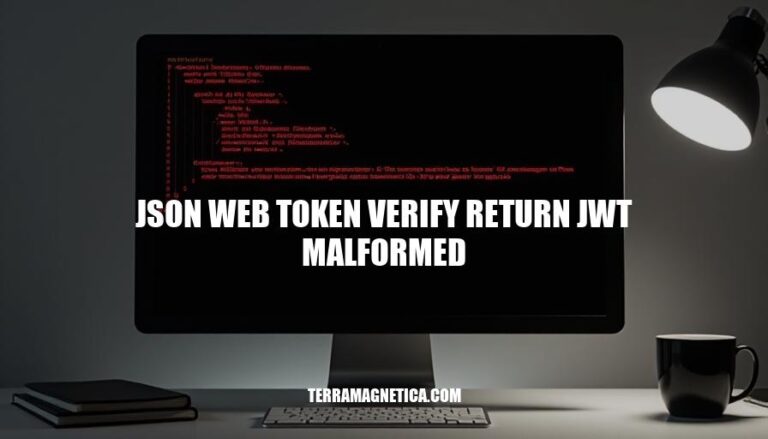


The “jwt malformed” error occurs when the jwt.verify() method in Node.js receives an invalid JSON Web Token (JWT). This typically happens if the token is null, undefined, or improperly formatted. Ensuring the token is correctly structured and valid before verification can prevent this error.
JSON Web Tokens (JWTs) are a compact, URL-safe means of representing claims to be transferred between two parties. They are commonly used for authentication and information exchange in web applications.
A JWT consists of three parts:
iss (issuer), exp (expiration time), and sub (subject).These parts are encoded in Base64Url and concatenated with periods, forming a string like header.payload.signature.
Correct formatting is crucial to avoid errors like ‘jwt malformed’. Ensure:
Incorrect formatting can lead to parsing errors and security vulnerabilities.
: How-To Geek
: jwt.io
Here are the various reasons why the jwt malformed error might occur when using the jwt.verify() method:
null or undefined value to jwt.verify() will result in this error.malformed error, an expired token can lead to similar issues if the token’s structure is altered during the expiration process.These are the primary reasons you might encounter the jwt malformed error when verifying a token.
Here are the step-by-step instructions to diagnose and fix the ‘jwt malformed’ error in Node.js:
Ensure the token you are passing to jwt.verify() is a valid JWT. A valid JWT has three parts separated by dots (e.g., header.payload.signature).
const token = "your.jwt.token";
if (token.split('.').length !== 3) {
throw new Error('Invalid token format');
}
Make sure the token is not null or undefined before verifying it.
if (!token) {
throw new Error('Token is null or undefined');
}
Ensure you are using the correct secret or public key to verify the token.
const secret = "your_secret_key";
try {
const decoded = jwt.verify(token, secret);
console.log(decoded);
} catch (err) {
console.error('Error verifying token:', err.message);
}
Catch and handle errors properly to understand the cause of the issue.
try {
const decoded = jwt.verify(token, secret);
console.log(decoded);
} catch (err) {
if (err.name === 'JsonWebTokenError') {
console.error('JWT Error:', err.message);
} else {
console.error('Other Error:', err.message);
}
}
If you are generating the token, ensure it is properly signed.
const payload = { foo: 'bar' };
const token = jwt.sign(payload, secret);
console.log(token);
By following these steps, you should be able to diagnose and fix the ‘jwt malformed’ error effectively.
To prevent the “jwt malformed” error, consider these strategies:
Validate Tokens Before Verification:
jwt.verify().Proper Token Generation:
jwt.sign() to generate tokens correctly.jwt.sign().Check Token Structure:
Error Handling:
jwt.verify() in a try-catch block to handle errors gracefully.Use Middleware:
Secure Token Storage:
By following these strategies, you can minimize the chances of encountering the “jwt malformed” error.
To diagnose and fix the jwt malformed error, it’s essential to understand the causes behind this issue. The error typically occurs when there is an issue with the JSON Web Token (JWT) itself, such as incorrect token structure, invalid payload, or signature mismatch.
When verifying a JWT using jwt.verify(), ensure that the token is not null or undefined and has a valid format consisting of three parts separated by dots (header, payload, signature). Properly generate tokens using jwt.sign() with correct payload and secret. Validate the token structure before verification to prevent errors.
To handle errors effectively, wrap jwt.verify() in a try-catch block to catch any exceptions that may occur during verification. Log errors for debugging purposes and provide meaningful feedback to users.
Best practices include validating token structure, using strong secrets, handling errors, implementing token expiry and refresh mechanisms, and storing tokens securely. By following these strategies, you can minimize the chances of encountering the jwt malformed error.
Properly validate tokens before verification by checking their format and structure. Ensure that the payload is correctly passed to jwt.sign() when generating tokens. Use tools like jwt.io to inspect and validate tokens. Implement middleware to validate tokens before processing requests and store tokens securely to prevent unauthorized access.
By understanding the causes of the jwt malformed error and implementing these best practices, you can effectively diagnose and fix this issue, ensuring secure token handling in your application.